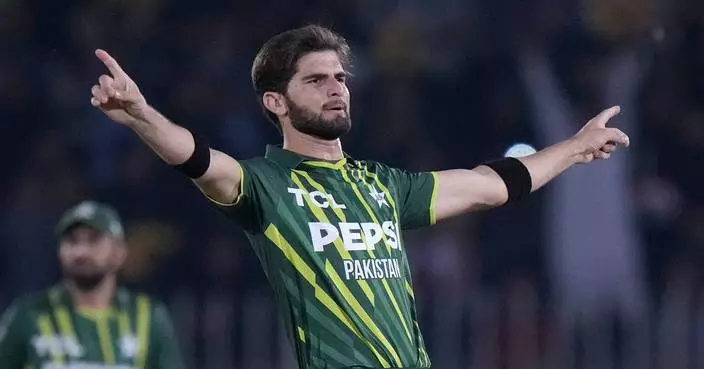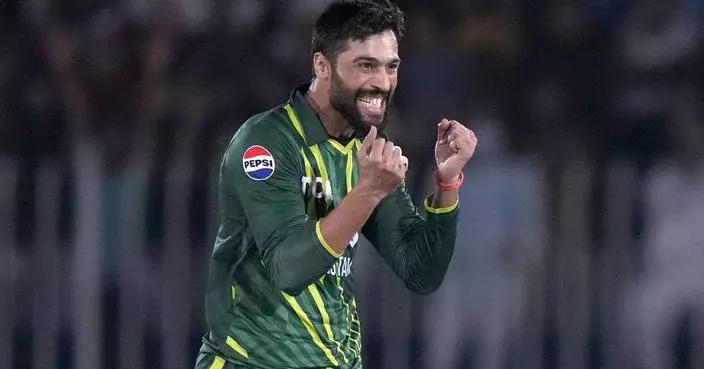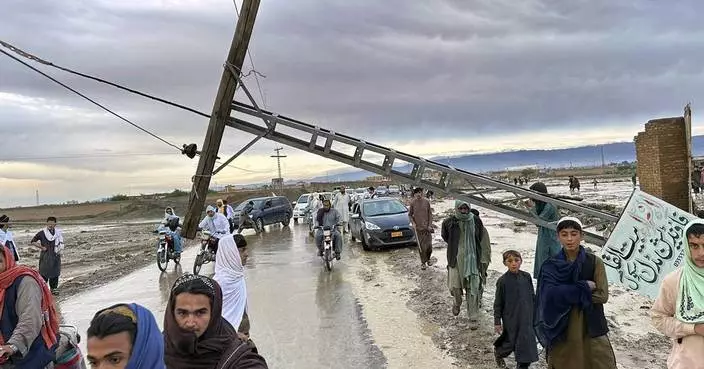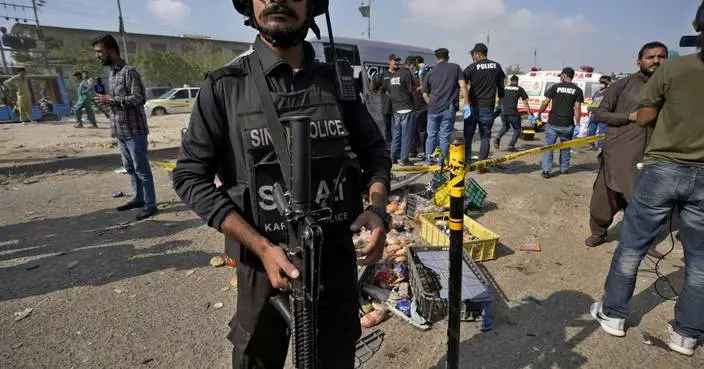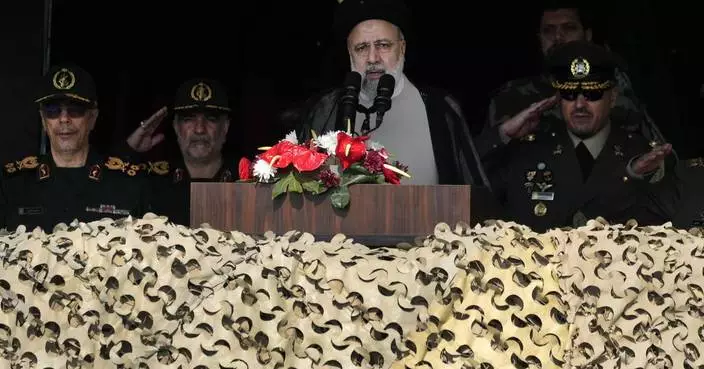A U.S. drone strike in northeastern Kunar province killed Pakistan Taliban chief Mullah Fazlullah, the insurgent leader who ordered the assassination of Nobel Peace Prize winner Malala Yousafzai, an Afghan Defense Ministry spokesman said Friday.
In a telephone interview, Mohammad Radmanish said Fazlullah and two other insurgents were killed early Thursday morning, just hours before Afghanistan's Taliban began a three-day cease fire to mark the Muslim holiday of Eid al-Fitr. The three-day holiday follows the end of Islam's holy month of Ramadan when devout adherents fast from sunrise to sunset.
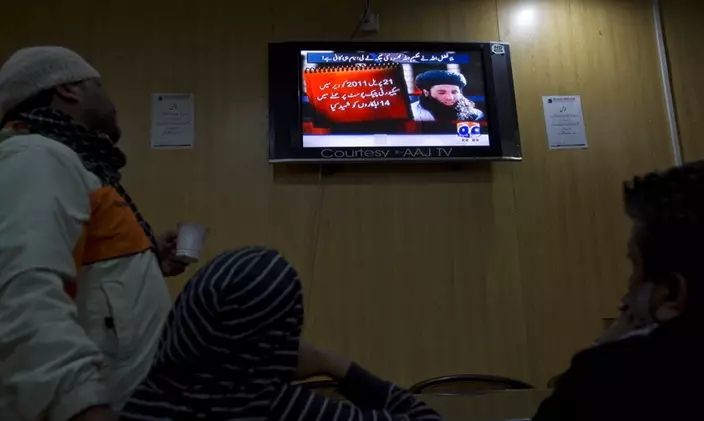
FILE - In this Nov. 7, 2013 file photo, people watch a news report on TV about newly selected leader of Pakistani Taliban leader Mullah Fazlullah at a coffee shop in Islamabad, Pakistan. An Afghan defense ministry official says Friday, June 15, 2018 a US drone strike in northeastern Kunar province killed Pakistan Taliban chief Mullah Fazlullah. Pakistan has been hunting Fazlullah for several years and has repeatedly said he was plotting attacks on Pakistan from safe havens in Afghanistan. The Arabic on the TV news report reads, "On April 21, 2011, fourteen troops were killed in an attack on a checkpoint in Dir." (AP Photo/B.K. Bangash, File)
However, Sakhi Mashwani, a Parliamentarian from Kunar province told the Associated Press that Fazlullah, along with five other insurgents, died when the strike slammed into the vehicle in which they were driving.
Mashwani said dozens of people, including Fazlullah's brother, Moheen Dada, gathered Friday in the Ghaziabad district of Kunar province, to offer prayers for the dead Taliban leader.
A U.S. official said the U.S. believes that it is likely the strike killed Fazlullah, but efforts are ongoing to confirm his death. The official spoke on condition of anonymity to discuss preliminary information.
According to a statement attributed to U.S. Forces-Afghanistan spokesman Lt. Col Martin O'Donnell, the U.S. carried out a "counterterrorism strike" Thursday in the border region between Afghanistan and Pakistan targeting "a senior leader of a designated terrorist organization."
The statement did not say whether the strike had killed anyone and did not identify Fazlullah as the target. However, the statement did note that the drone attack did not violate a cease-fire announcement made June 7 by Afghan President Ashraf Ghani. The Taliban's promise of a temporary truce came on Monday.
Radmanish said the drone attack took place in Marawara district, near the border.
Pakistan's military refused to comment on the report of Fazlullah's death saying any information would have to come from Washington. Yet Fazlullah's death would be welcome news in Pakistan, where the government has repeatedly complained that Fazlullah and his Tehrik-e-Taliban had found safe havens across the border in Afghanistan. Meanwhile, Kabul and Washington both complain that Pakistan has for years allowed Afghanistan's Taliban free movement as well as medical treatment for battlefield wounds.
Still, the recent cease-fire announcement by Afghanistan's Taliban is being at least partially credited to Pakistan, which some observers say has been pressing the leadership to accept President Ghani's recent peace overtures.
In his Eid greeting this week, Afghan Taliban chief Haibatullah Akhunzada repeated the Taliban demand for direct talks with the United States before opening negotiations with the Afghan government. Until now, Washington has refused.
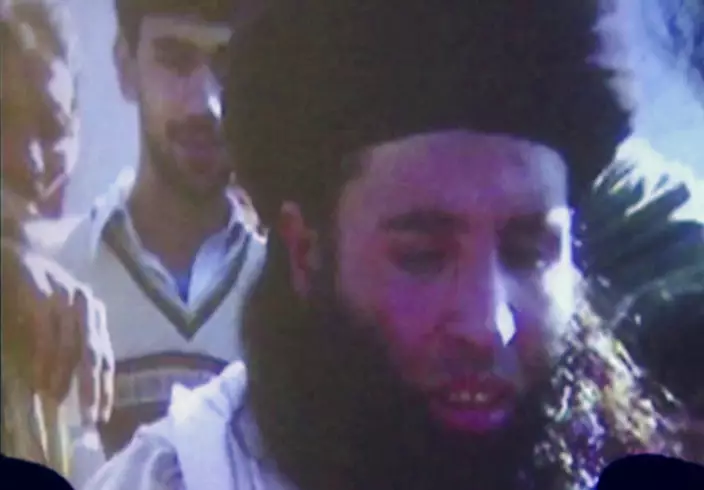
FILE - In this file image made from video broadcast on Thursday, Nov. 7, 2013, undated footage of Mullah Fazlullah is shown on a projector in Pakistan. An Afghan defense ministry official says Friday, June 15, 2018 a US drone strike in northeastern Kunar province killed Pakistan Taliban chief Mullah Fazlullah. Pakistan has been hunting Fazlullah for several years and has repeatedly said he was plotting attacks on Pakistan from safe havens in Afghanistan. (AP Photo via AP Video, File)
It was Yousafzai's open call for girls' education and criticism of the Taliban that infuriated Fazlullah. She was just 14 when she survived the assassination attempt in 2012. Her return to her hometown earlier this year seemed a particular triumph as it was also to open a school funded by a charity she established to promote girls education globally.
She has often said that Fazlullah's attempts to silence her backfired and instead he amplified her voice around the world.
A ruthless leader, Fazlullah ordered the bombing and beheadings of dozens of opponents when his band of insurgents controlled Pakistan's picturesque Swat Valley from 2007 until a massive military operation routed them in 2009.
In Yousafzai's hometown of Mingora in the Swat Valley, residents welcomed reports of Fazlullah's death with one resident saying many feared he would return one day to re-impose his violent rule.
"We witnessed the brutality of the Taliban in Swat when Fazlullah and his men were present here and we are happy to know that he has gone to hell," said Idrees Khan, a member of a local elders peace committee. "People in Swat will feel safer after the killing of Fazlullah."
His insurgent group, the Tehrik-e-Taliban, also took responsibility for the brutal attack on an Army Public School in Pakistan's northwestern city of Peshawar in December 2014 when more than 140 children and their teachers were slaughtered.
Survivors of the attack told of insurgents roaming through the school shooting their victims, some as young as six years old, in the head.
Mohammad Akhtar, whose 12-year-old son Fahad Khan died in the 2014 massacre, said he had been waiting for confirmation of "terrorist Fazlullah's" death.
"Thank God, he is dead," he said after returning from a visit to his son's grave.
Fazlullah rose to prominence through radio broadcasts in Swat demanding the imposition of Islamic law, earning him the nickname "Mullah Radio." His radio talks also aired the grievances of many in the northwest against the government, such as its slow-moving justice system. He also reached out to women, promising to address their complaints about not getting a fair share of their inheritance.
His brutality often included public beheadings, often of police officers. His exact age is not known but he was believed to be in his late 30s.
ISLAMABAD (AP) — The leaders of Iran and Pakistan agreed to strengthen economic and security cooperation in a meeting on Monday that sought to smooth over a diplomatic rift.
Ties were strained between the neighbors in January when each carried out strikes in the other’s territory, targeting militants accused of attacking security forces.
Iran’s President Ebrahim Raisi met with Pakistani Prime Minister Shehbaz Sharif and other officials on his three-day visit. Authorities deployed hundreds of additional police and paramilitary forces for security.
Pakistan has witnessed a surge in militant violence in recent months, mostly blamed on Pakistani Taliban and insurgents targeting security forces in Pakistan and neighboring Iran.
According to a statement, the two leaders discussed a range of bilateral issues and vowed to cooperate to fight terrorism. They reiterated their condemnations of Israel's war against Hamas in Gaza.
Sharif praised Iran’s “strong stand on the issue of Palestine” and said “Pakistan is also with the Palestinians.”
Raisi said the killings by Israel in Gaza were being committed with the support of the United States and other Western countries. He criticized international organizations, including the United Nations, saying, “They say they support human rights, but they proved that they are inefficient.”
The visit comes after Iran’s unprecedented direct strikes on Israel and an apparent Israeli response. Pakistan is among the countries that have no diplomatic relations with Israel because of the issue of Palestinian statehood.
Raisi also vowed to boost what he called “unacceptably” meager bilateral trade with Pakistan and called for setting up more border markets. Pakistan and Iran set up the first such border market in southwestern Pakistan's Baluchistan province last year, promising five more under a 2012 agreement.
The two leaders signed eight cooperation agreements, according to Sharif's office.
Authorities said the two sides also discussed a multi-billion gas pipeline project, on hold since 2014. The project — opposed by Washington as a violation of sanctions imposed on Tehran over its nuclear program — launched in 2013 to supply Iranian natural gas to energy-starved Pakistan.
Iran says it had already completed the pipeline on its side of the border after investing $2 billion. Pakistan was supposed to finish construction on its territory by the end of 2014 but work stalled, leading to tensions between the nations.
The Iranian president later met with his Pakistani counterpart Asil Ali Zardari, who helped launch the pipeline project after traveling to Iran in 2013.
On Monday night, Pakistan's powerful army chief Gen. Asim Munir met with the Iranian president, the military said in a statement. It said their discussion focused on "matters of mutual interest, notably regional peace, stability and border security.”
The statement said Munir described the Pakistan-Iran border as “the border of peace and friendship" but emphasized the need for improved coordination there “to prevent terrorists from jeopardizing the longstanding brotherly relations.”
It quoted Raisi as saying that by fostering cooperation between the militaries, Iran and Pakistan “can attain peace and stability for both nations and the region."
Raisi also met with Pakistan's Foreign Minister Ishaq Dar. The two discussed regional and global developments and “affirmed commitment to peace and constructive dialogue for resolving regional challenges."
Raisi is accompanied by his spouse and a high-level delegation. He plans to visit Karachi, Pakistan's biggest city, and Lahore, where he will meet with the country's recently elected first female chief minister, Maryam Nawaz Sharif.
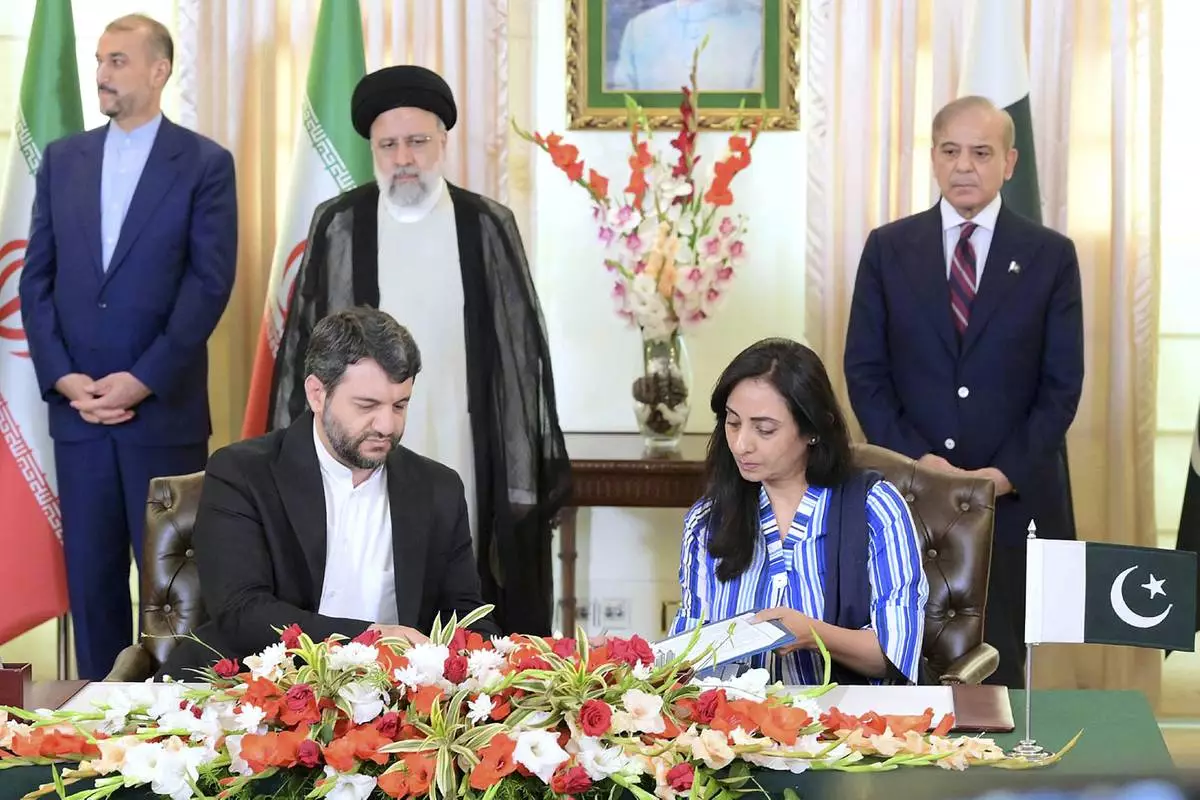
In this photo released by Press Information Department, Iranian President Ebrahim Raisi, second left back, with Pakistan's Prime Minister Shehbaz Sharif, right back, witness a signing of MoUs of cooperation in different fields between Iran and Pakistan at prime minister house in Islamabad, Pakistan, Monday, April 22, 2024. Iranian and Pakistani leaders vowed to strengthen economic and security cooperation in a meeting on Monday, as the two countries seek to smooth over a diplomatic rift. (Press Information Department via AP)
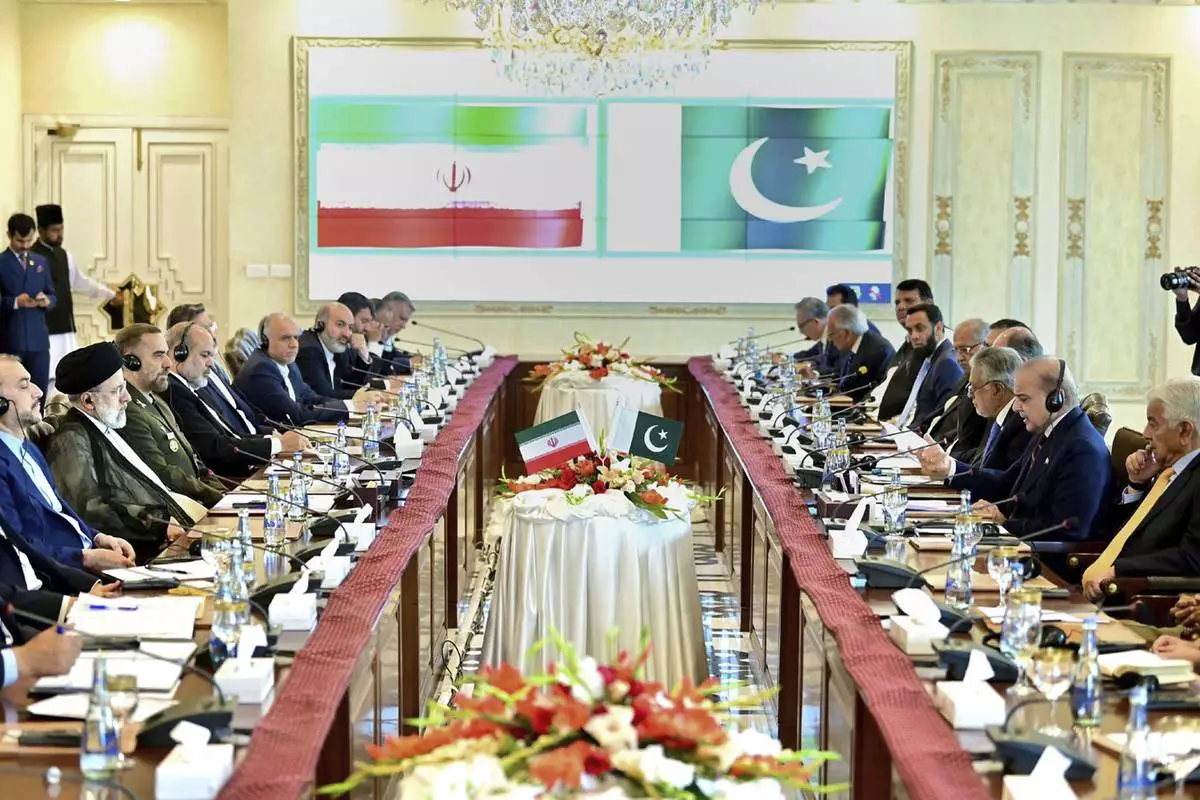
In this photo released by Press Information Department, Iranian President Ebrahim Raisi, second left, holds official talks with Pakistan's Prime Minister Shehbaz Sharif, second right, at prime minister house in Islamabad, Pakistan, Monday, April 22, 2024. Iranian and Pakistani leaders vowed to strengthen economic and security cooperation in a meeting on Monday, as the two countries seek to smooth over a diplomatic rift. (Press Information Department via AP)
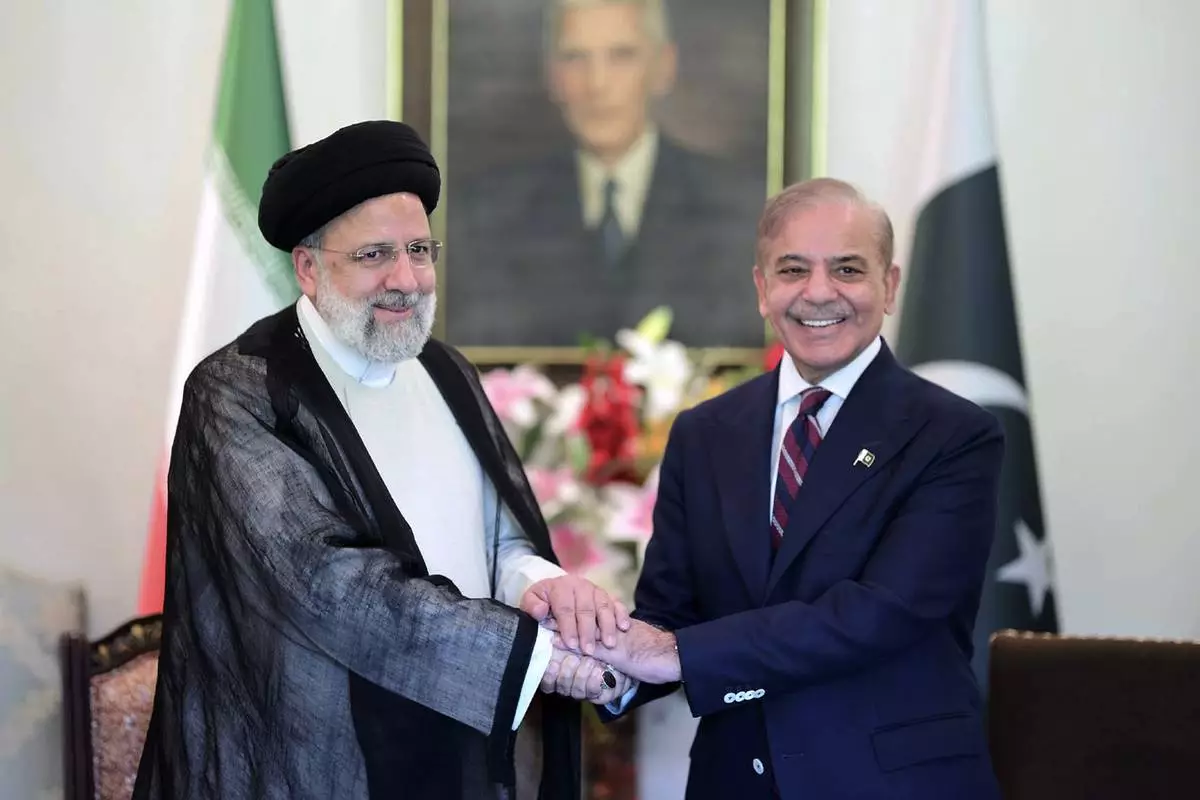
In this photo released by Press Information Department, Iranian President Ebrahim Raisi, left, shakes hand with Pakistan's Prime Minister Shehbaz Sharif prior to their meeting at prime minister house in Islamabad, Pakistan, Monday, April 22, 2024. Iranian and Pakistani leaders vowed to strengthen economic and security cooperation in a meeting on Monday, as the two countries seek to smooth over a diplomatic rift. (Press Information Department via AP)
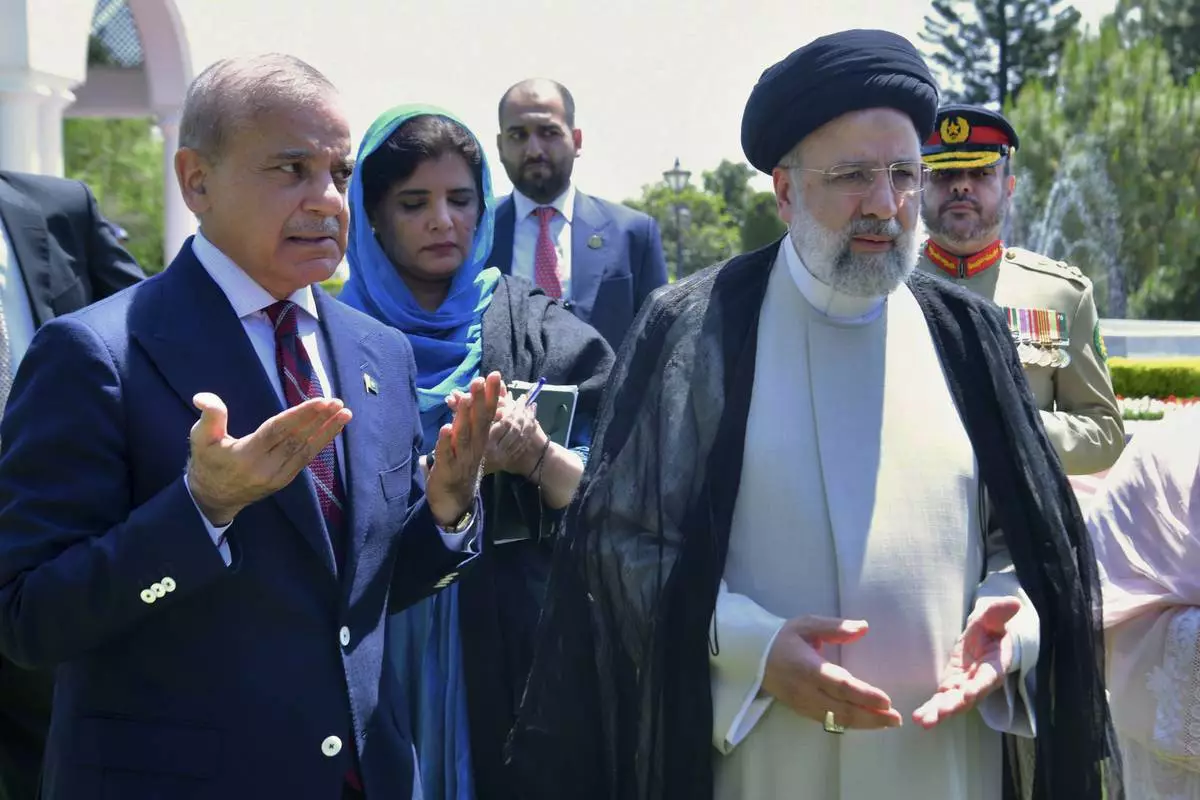
In this photo released by Prime Minister Office, Iranian President Ebrahim Raisi, right, with Pakistan's Prime Minister Shehbaz Sharif, left, prays after planting a tree in the prime minister house in Islamabad, Pakistan, Monday, April 22, 2024. (Prime Minister Office via AP)
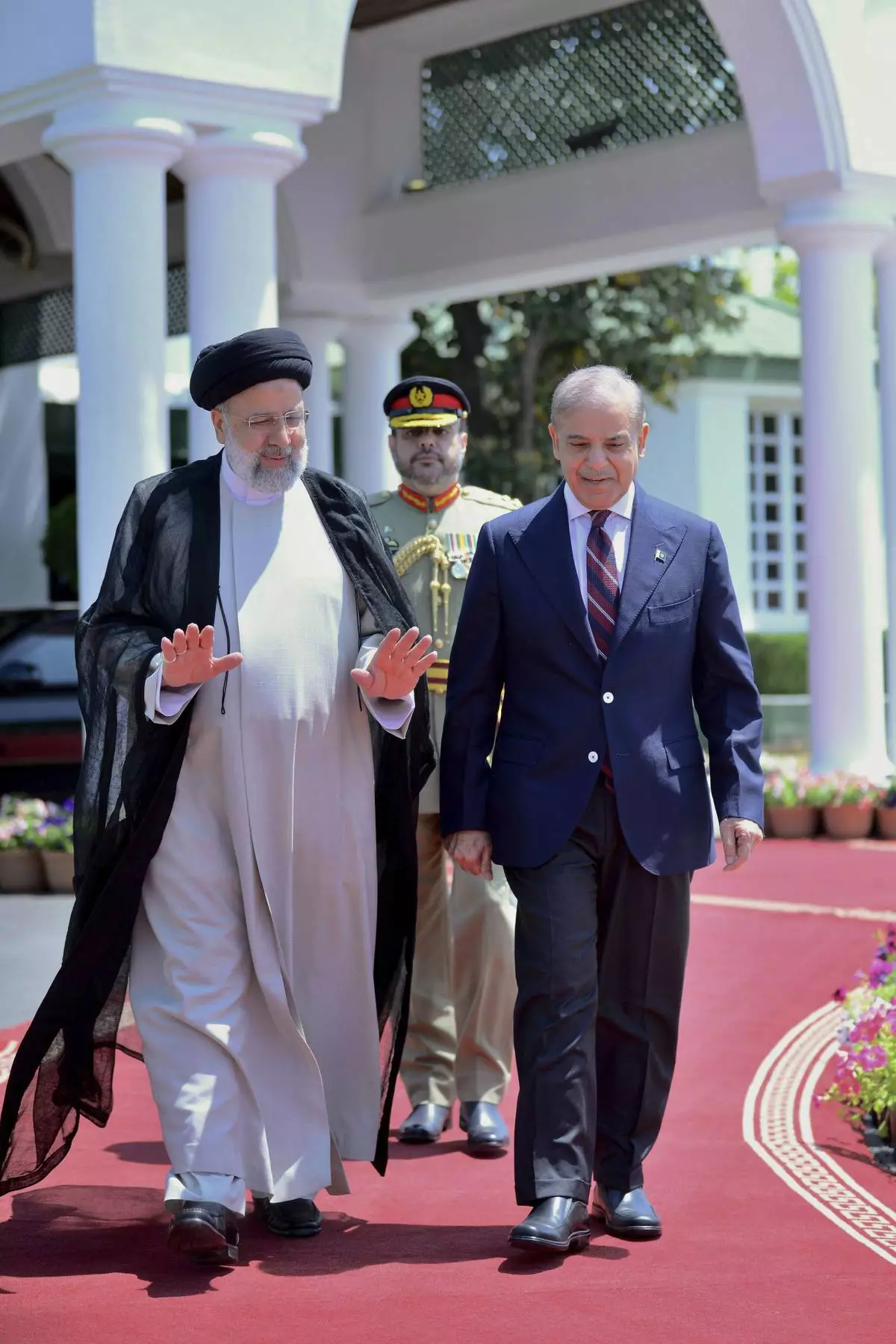
In this photo released by Prime Minister Office, Iranian President Ebrahim Raisi, left, walks with Pakistan's Prime Minister Shehbaz Sharif during a welcome ceremony in the prime minister house in Islamabad, Pakistan, Monday, April 22, 2024. (Prime Minister Office via AP)
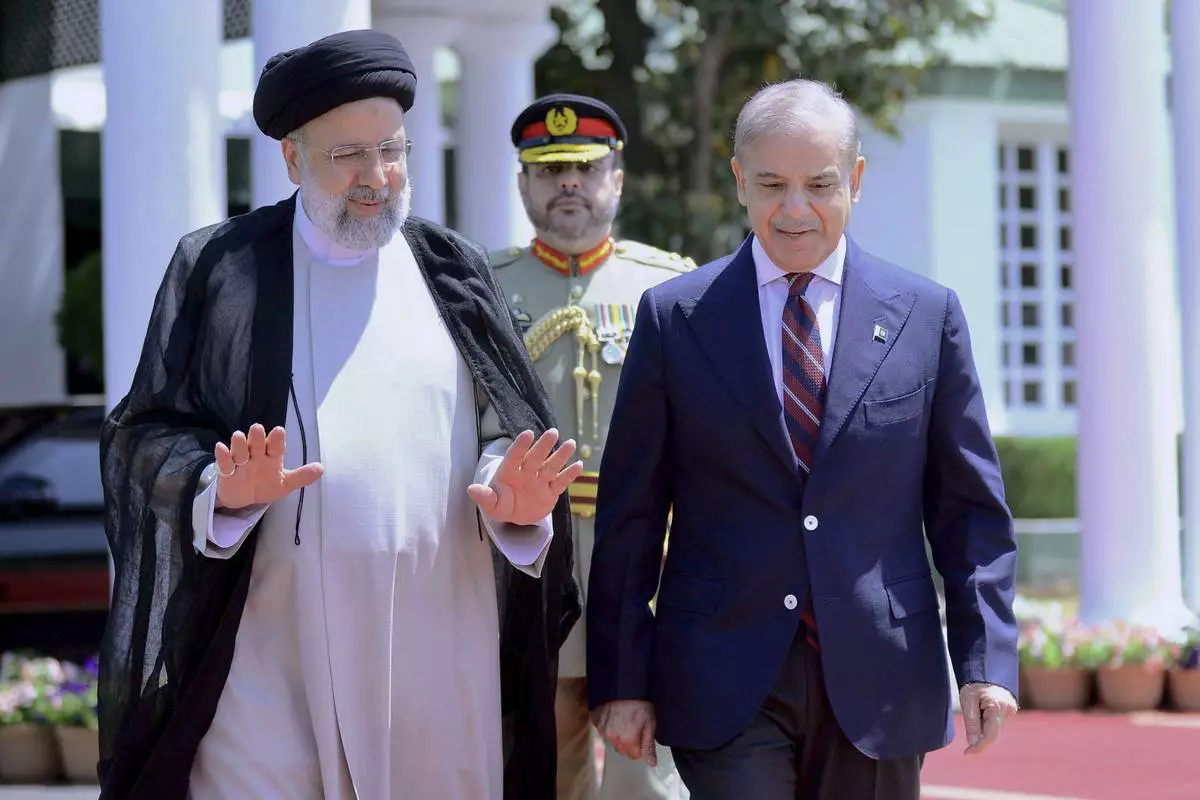
In this photo released by Prime Minister Office, Iranian President Ebrahim Raisi, left, walks with Pakistan's Prime Minister Shehbaz Sharif during a welcome ceremony in the prime minister house in Islamabad, Pakistan, Monday, April 22, 2024. (Prime Minister Office via AP)
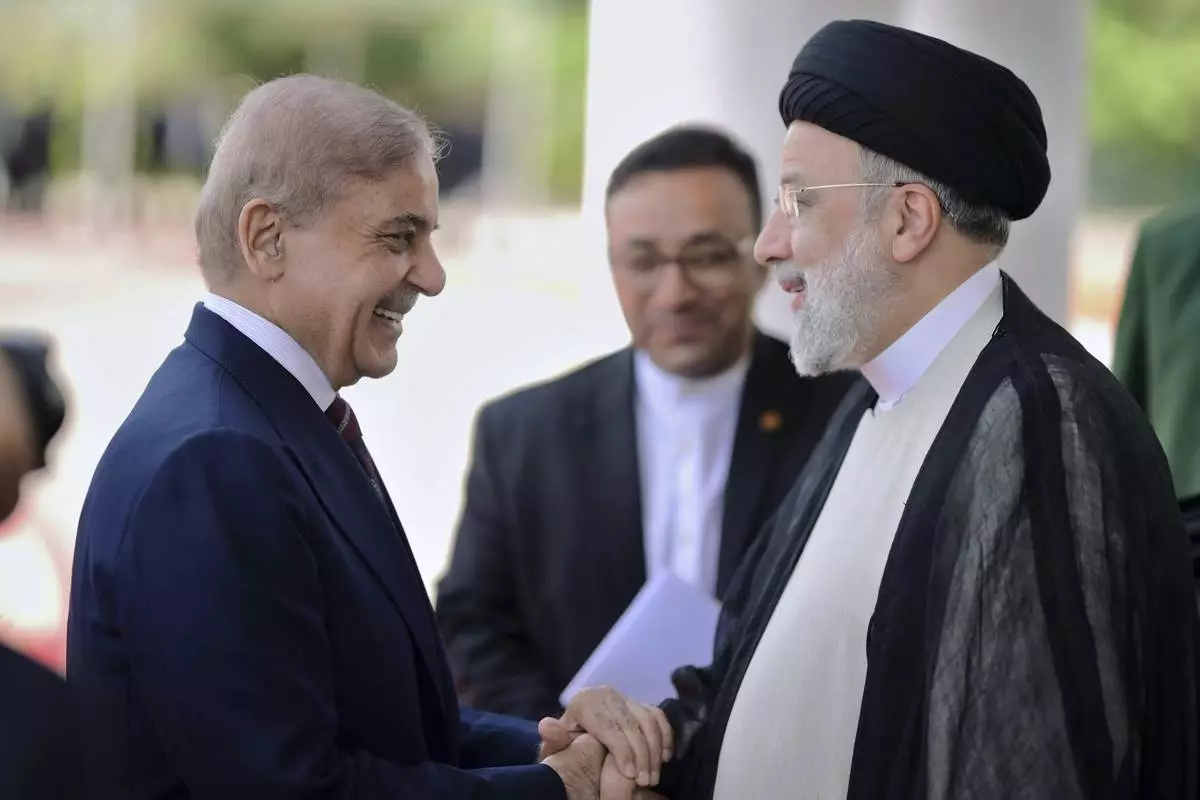
In this photo released by Prime Minister Office, Pakistan's Prime Minister Shehbaz Sharif, left, greets to Iranian President Ebrahim Raisi upon his arrival in the prime minister house in Islamabad, Pakistan, Monday, April 22, 2024. (Prime Minister Office via AP)
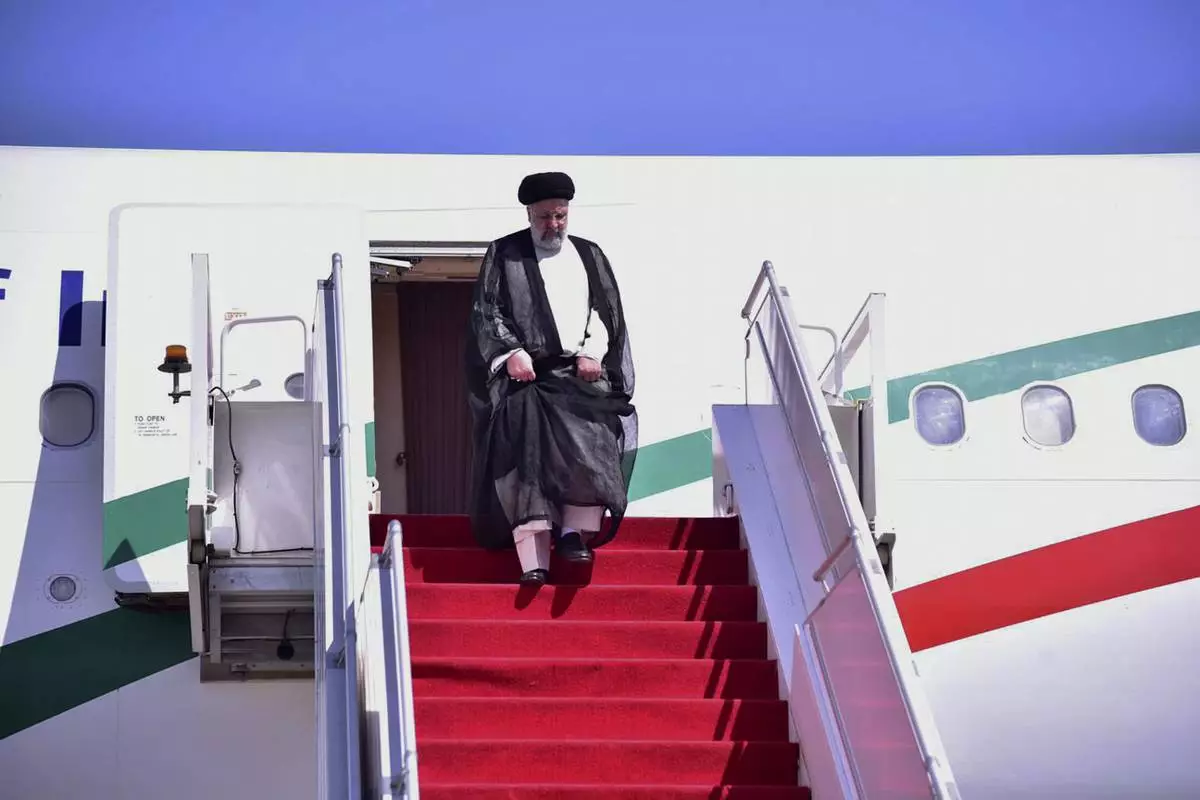
In this photo released by Pakistan's Ministry of Foreign Affairs, Iranian President Ebrahim Raisi gets down from plane upon his arrival in Islamabad, Pakistan, Monday, April 22, 2024. Raisi arrived in Islamabad on a three-day visit on Monday, during which he will discuss a range of issues with authorities in Pakistan's capital, officials said. (Ministry of Foreign Affairs via AP)













